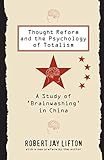The New York Times ran an interesting article last week on the origins of the interrogation techniques used at Guantanamo Bay. The article claims that methods for questioning prisoners at the facility were directly adapted from those used by the Communist Chinese to torture and indoctrinate American soldiers during the Korean War. At the time, rumors regarding these techniques, known in Chinese as xinao – literally translated as “brainwashing” – inspired a few brief bouts of hysteria, as well as the “classic” novel The Manchurian Candidate, later made into a movie starring Frank Sinatra.
 Those interested in peeking behind Guantanamo’s walls should pick up a copy of Robert Lifton’s classic work Thought Reform and the Psychology of Totalism: A Study of “Brainwashing” in China [1]. Lifton, a Harvard professor, makes only a brief appearance in the Times article, but his book is the seminal work on brainwashing techniques and is often used as text for teaching about the indoctrination methods of cults. In the book, Lifton interviews a number of Westerners and Chinese who were subjected to thought reform, delving into their prison experience, as well as their lives before and after. Although Lifton spends too much time on Freudian psychoanalysis for my tastes, his case studies are raw and chilling accounts of people whose lives have been irreversibly altered. Although for most subjects the superficial effects of the indoctrination process quickly wore off, the psychological scars were permanent. The men and women Lifton interviewed are broken, struggling to piece together their dignity and sense of self.
Those interested in peeking behind Guantanamo’s walls should pick up a copy of Robert Lifton’s classic work Thought Reform and the Psychology of Totalism: A Study of “Brainwashing” in China [1]. Lifton, a Harvard professor, makes only a brief appearance in the Times article, but his book is the seminal work on brainwashing techniques and is often used as text for teaching about the indoctrination methods of cults. In the book, Lifton interviews a number of Westerners and Chinese who were subjected to thought reform, delving into their prison experience, as well as their lives before and after. Although Lifton spends too much time on Freudian psychoanalysis for my tastes, his case studies are raw and chilling accounts of people whose lives have been irreversibly altered. Although for most subjects the superficial effects of the indoctrination process quickly wore off, the psychological scars were permanent. The men and women Lifton interviewed are broken, struggling to piece together their dignity and sense of self.
The U.S. Military, of course, is not interested in indoctrination techniques, so much as the methods used by Chinese interrogators to elicit confessions from their prisoners. The irony is that the ultimate purpose of these techniques was not to obtain useful information, but to inculcate prisoners with Maoist ideology. As Lifton describes in detail, interrogators forced prisoners to confess to crimes they did not commit as a means of controlling their inner life. The so-called “confessions” were entirely made up, or, even more tellingly, force-fed to prisoners, who were expected to repeat them until they could no longer distinguish them from the truth.
The military knows this. After all, the armed forces and the CIA have used these techniques as part of SERE (Survival, Evasion, Resistance, Escape) and similar training programs for years. These programs, which are meant to prepare personnel to resist torture methods they may encounter in the field, are rumored to use many of the techniques that appear in the Guantanamo Bay document. The programs reportedly emphasize the use of stress positions, waterboarding, and other “fraternity pranks” (as Rush Limbaugh affectionately referred to them) to elicit false confessions from participants.
What are the interrogators thinking? Their goals may not be that different than those of the Communist Chinese. After all, the Bush administration, much like the Maoists, is not interested in truth. Rather, they are interested in constructing their own reality. There’s only a fine line between Mao’s insistence that the Great Leap Forward and the Cultural Revolution were successful and Bush’s declaration that the war in Iraq was a “Mission Accomplished.” As one Bush aide famously said in a quote that could be taken directly from Lifton’s Eight Criteria for Thought Reform
“We create our own reality. And while you’re studying that reality – judiciously, as you will – we’ll act again, creating other new realities, which you can study too, and that’s how things will sort out. We’re history’s actors… and you, all of you, will be left to just study what we do…” – “Faith, Certainty and the Presidency of George W. Bush” New York Times Magazine October 17, 2004
This same reckless desire has led the administration to manufacture evidence for the war in Iraq, deny the truth of global climate change, and create countless fabrications that serve only to support their own insular vision of how they think the world ought to be. How surprising would it be then, if interrogators at Guantanamo Bay were not looking for the truth, but only for support for the administration’s version of events, confessions they can use to further justify their actions, confessions they can use to try to convince us, the viewers at home, that they have been right all along. After all, the information possessed by Guantanamo’s prisoners is as much as seven years out of date, seemingly well past its expiration date. And although seven years would seem to be ample time to conduct an interrogation, it’s about the right length for Chinese reeducation methods.
But don’t take my word for it. Read the book.
[1] Other chilling accounts of these techniques can be found in the excellent book Japan at War, which includes interviews with Japanese POWs who suffered through the Chinese reeducation process.








